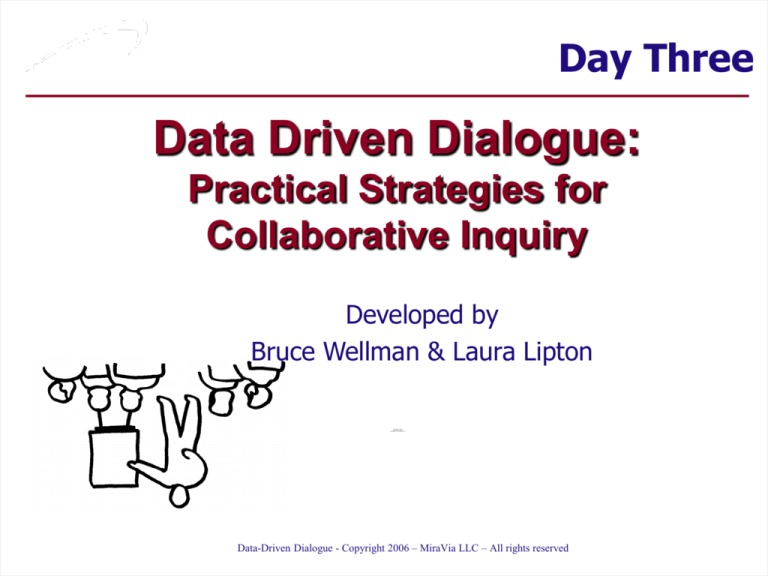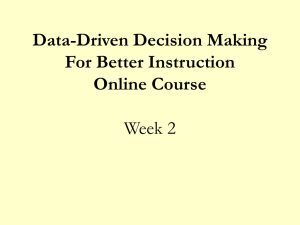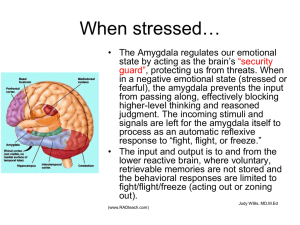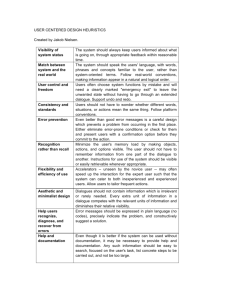
Day Three
Data Driven Dialogue:
Practical Strategies for
Collaborative Inquiry
Developed by
Bruce Wellman & Laura Lipton
Q uickTim e™ and a
None decom pr essor
ar e needed t o see t his pict ur e.
Data-Driven Dialogue - Copyright 2006 – MiraVia LLC – All rights reserved
Road Sign Synectics
With your
table
group,
brainstorm
ways in
which the
road signs
are like:
Collaborative Inquiry
Data-Driven Dialogue - Copyright 2006 – MiraVia LLC – All rights reserved
LEARNING PARTNERS handout p.27
_______________
Your partner’s name
______________
_______________
______________
Data-Driven Dialogue - Copyright 2006 – MiraVia LLC – All rights reserved
Driving Forces Shifting From
Shifting to
• A teaching focus
• A learning focus
• Teaching as private
practice
• Teaching as collaborative
practice
• School improvement as
an option
• School improvement as
a requirement
• Accountability
• Responsibility
Data-Driven Dialogue - Copyright 2006 – MiraVia LLC – All rights reserved
p.2
Response - ability
Data-Driven Dialogue - Copyright 2006 – MiraVia LLC – All rights reserved
Unpacking - h/o p. 4
What’s in your luggage?
Successes
Challenges
Questions
Data-Driven Dialogue - Copyright 2006 – MiraVia LLC – All rights reserved
Pair and Share
Join your
Join
Partner
two other
pairs
Data-Driven Dialogue - Copyright 2006 – MiraVia LLC – All rights reserved
Unpacking
First, share your successes in round- robin
fashion
Be ready to report themes (not anecdotes)
Next, share your challenges (again,
in round-robin fashion)
Be ready to report themes (not anecdotes)
Finally, share your questions, and
choose 2-3 to record on a chart
Data-Driven Dialogue - Copyright 2006 – MiraVia LLC – All rights reserved
BREAK
Please return at 10:00
Data-Driven Dialogue - Copyright 2006 – MiraVia LLC – All rights reserved
Windows
Imagine you are observing a group struggling as it
works with data.
Group members are:
• off-task
• unfocused
• unproductive
What specifically do you see and hear?
Data-Driven Dialogue - Copyright 2006 – MiraVia LLC – All rights reserved
Mirrors
Imagine you in a special mirrored meeting room
where you can observe your reflection.
What do you see and hear yourself doing to help the
group:
• focus
• hear one another
• and support the development of
shared understanding
Data-Driven Dialogue - Copyright 2006 – MiraVia LLC – All rights reserved
A to Z Listing
With your partner:
Review the Collaborative
Learning Cycle (pp.44-50)
Use the alphabet to organize
key information.
NOTE: thoughts should be
expressed in complete
phrases or sentences
A _________
B _________
C _________
D _________
E _________
F _________
G _________
H _________
I _________
J _________
K _________
L _________
M _________
Data-Driven Dialogue - Copyright 2006 – MiraVia LLC – All rights reserved
h/o p. 6
N _________
O _________
P _________
Q _________
R _________
S _________
T _________
U _________
V _________
W_________
X _________
Y ___***____
Z ___***____
COLLABORATIVE LEARNING
CYCLE - Pg.44
Organizing
and
Integrating
Activating
and
Engaging
Managing
Modeling
Mediating
Monitoring
Data-Driven Dialogue - Copyright 2006 – MiraVia LLC – All rights reserved
Exploring
and
Discovering
COLLABORATIVE LEARNING
CYCLE - Pg.44
Organizing
and
Integrating
Activating
and
Engaging
Managing
Modeling
Mediating
Monitoring
Data-Driven Dialogue - Copyright 2006 – MiraVia LLC – All rights reserved
Exploring
and
Discovering
COLLABORATIVE LEARNING
CYCLE
Organizing and Integrating
Generating Theory
What inferences/explanations/conclusions
might we draw? (causation)
What additional data sources might we
explore to verify our explanations?
(confirmation)
What are some solutions we might
explore as a result of our conclusions?
(action)
What data will we need to collect to
guide implementation? (calibration)
Managing
Modeling
Mediating
Monitoring
Data-Driven Dialogue - Copyright 2006 – MiraVia LLC – All rights reserved
Stem Completion
• “Skillful student writers…………..”
• “Effective teachers of writing………”
Write each response on a separate index card
Data-Driven Dialogue - Copyright 2006 – MiraVia LLC – All rights reserved
Card Stack and Shuffle
Table Groups:
• Stack your cards and shuffle them.
• Swap stacks with another group
• Person “A” selects a card and reads it aloud.
• Group members identify possible assumptions related to the
response on the card.
• Repeat the pattern with “B”, “C” and “D” drawing cards in turn.
Data-Driven Dialogue - Copyright 2006 – MiraVia LLC – All rights reserved
Card Stack and Shuffle
Table Groups:
• Identify 2-3 assumptions
that have the greatest
implications for your work.
Assumptions
• Record these on the left
side of a T-Chart.
• Then list some the implications
of those assumptions
Data-Driven Dialogue - Copyright 2006 – MiraVia LLC – All rights reserved
Implications
Card Stack and Shuffle
Stem Completion:
Effective teachers of writing teach process, not just
end product
Implications
Assumptions
Effective teachers
have the skills and
knowledge to teach
writing process
Teachers need skills and
tools to assess their own
skill/ knowledge base
Professional development
needs to be targeted to
these needs
Data-Driven Dialogue - Copyright 2006 – MiraVia LLC – All rights reserved
LUNCH
Please return at 12:55
Data-Driven Dialogue - Copyright 2006 – MiraVia LLC – All rights reserved
Regrouping
And join
Join your
Partner
Another
pair to form
a quartet
Data-Driven Dialogue - Copyright 2006 – MiraVia LLC – All rights reserved
COLLABORATIVE LEARNING
CYCLE
Organizing and Integrating
Generating Theory
What inferences/explanations/conclusions
might we draw? (causation)
What additional data sources might we
explore to verify our explanations?
(confirmation)
What are some solutions we might
explore as a result of our conclusions?
(action)
What data will we need to collect to
guide implementation? (calibration)
Managing
Modeling
Mediating
Monitoring
Data-Driven Dialogue - Copyright 2006 – MiraVia LLC – All rights reserved
Student Writing
Achievement
Drivers
Interrelationship Diagrams
Effects
Data-Driven Dialogue - Copyright 2006 – MiraVia LLC – All rights reserved
Student Writing
Achievement
Teacher
knowledge
and skills
Interrelationship Diagrams
State
Standards
Student
Motivation
Assessment
and Feedback
Practices
Drivers
Student
Reading
Skills
Writing
Instructional
Practices
Parental
Expectations
Student
Vocabulary
Effects
Data-Driven Dialogue - Copyright 2006 – MiraVia LLC – All rights reserved
Student Writing
Achievement
Interrelationship Diagrams
Driver
Teacher
knowledge
and skills
Effect
State
Standards
5/2
Student
Motivation
Assessment
and Feedback
3/4
Parental
Expectations
Student
Reading
Skills
Instructional
Practices
Student
Vocabulary
Data-Driven Dialogue - Copyright 2006 – MiraVia LLC – All rights reserved
Student Writing Interrelationship Diagrams
Achievement
Drivers
Effects
List those elements
that have the most
arrows going “out”
List those elements
that have the most
arrows going “in”
Data-Driven Dialogue - Copyright 2006 – MiraVia LLC – All rights reserved
Reflection
What might this strategy produce for
groups with whom you work?
What are some things that “get in the
way” of effective process?
What are some potential applications
for you?
Data-Driven Dialogue - Copyright 2006 – MiraVia LLC – All rights reserved
BREAK
Please return at 2:08
Data-Driven Dialogue - Copyright 2006 – MiraVia LLC – All rights reserved
3 – 2 – 1 +1
H/O p. 26
3 – Strong suits
2 – Growth areas
1 – point to ponder
Data-Driven Dialogue - Copyright 2006 – MiraVia LLC – All rights reserved
Circle Map
Topic:
School
Improvement
Generate associations
with this topic and
record them inside the
circle.
Categorize your ideas
and record the
category labels on the
top sections of your
chart.
Data-Driven Dialogue - Copyright 2006 – MiraVia LLC – All rights reserved
Frames of Reference
School Improvement
Select a frame of reference
to apply to your circle map:
Options:
• students
• parents
• school board members
• legislators
1. Identify which of your
ideas would be included
on their maps.
2. Add ideas that they
would include that you
did not.
(Use a new color)
Data-Driven Dialogue - Copyright 2006 – MiraVia LLC – All rights reserved
Give One to Get One
List one important idea from this session.
Data-Driven Dialogue - Copyright 2006 – MiraVia LLC – All rights reserved
Give One to Get One
Move about the room and exchange
‘cards’ with one of your colleagues.
Then move about the room and
exchange your new ‘card’ with
another of your colleagues.
Data-Driven Dialogue - Copyright 2006 – MiraVia LLC – All rights reserved
Give One to Get One
Return to home-base and share
your cards.
Identify themes and patterns in
what you have found.
Data-Driven Dialogue - Copyright 2006 – MiraVia LLC – All rights reserved







![Your_Solutions_LLC_-_New_Business3[1]](http://s2.studylib.net/store/data/005544494_1-444a738d95c4d66d28ef7ef4e25c86f0-300x300.png)